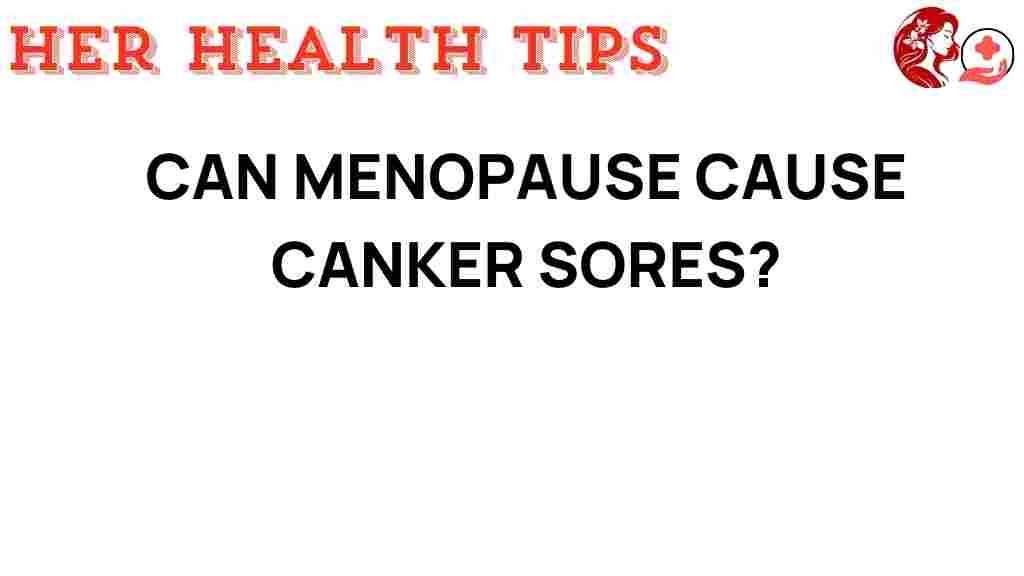Unraveling the Connection: Can Menopause Trigger Canker Sores?
Menopause is a significant phase in a woman’s life marked by various physical and emotional changes. One of the lesser-known issues that can arise during this transition is the occurrence of canker sores. These painful mouth ulcers can disrupt daily life and are often linked to hormonal changes that occur during menopause. In this article, we will explore the connection between menopause and canker sores, delve into the symptoms, discuss treatment options, and provide tips for maintaining oral health during this phase of life.
Understanding Menopause and Hormonal Changes
Menopause is defined as the time in a woman’s life when her menstrual cycles cease permanently, typically occurring between the ages of 45 and 55. This transition is characterized by a decrease in the production of hormones such as estrogen and progesterone, leading to various symptoms, including:
- Hot flashes
- Night sweats
- Mood swings
- Vaginal dryness
- Sleep disturbances
These hormonal changes can also impact oral health, leading to conditions like canker sores. The decline in estrogen, in particular, has been linked to increased inflammation in the body, which can trigger the development of these sores.
What Are Canker Sores?
Canker sores, also known as aphthous ulcers, are small, painful lesions that develop inside the mouth. They can appear on the tongue, the inside of the cheeks, or at the base of the gums. Canker sores are not contagious but can be quite uncomfortable, making eating and speaking difficult.
Symptoms of Canker Sores
The symptoms of canker sores include:
- Small, round lesions with a white or gray center and a red halo
- Burning or tingling sensation before the sore appears
- Pain that may increase when eating or drinking
- Swelling and inflammation in the affected area
The Link Between Menopause and Canker Sores
Research suggests that hormonal changes during menopause can lead to various oral health issues, including an increased risk of canker sores. Some of the potential connections include:
- Decreased Estrogen Levels: Estrogen plays a vital role in maintaining the mucosal health of the oral cavity. A decrease in estrogen can lead to oral dryness and an increased susceptibility to infections and sores.
- Inflammation: Hormonal fluctuations can trigger inflammatory responses in the body, which may contribute to the occurrence of canker sores.
- Stress and Mood Changes: The emotional and psychological stress associated with menopause can weaken the immune system, making one more prone to developing canker sores.
Maintaining Oral Health During Menopause
To prevent canker sores and promote overall oral health during menopause, women should consider the following strategies:
1. Stay Hydrated
Drinking plenty of water helps keep the mouth moist and reduces the risk of dryness, which can contribute to canker sores.
2. Use a Humidifier
If you experience dry mouth, especially during the night, using a humidifier can help maintain moisture levels in the air.
3. Maintain a Balanced Diet
A diet rich in vitamins and minerals is essential for oral health. Focus on:
- Fruits and vegetables
- Whole grains
- Lean proteins
- Dairy products (if tolerated)
4. Manage Stress
Incorporating relaxation techniques such as yoga, meditation, or deep breathing exercises can help manage stress levels, potentially reducing the frequency of canker sores.
5. Regular Dental Check-ups
Regular visits to the dentist can help monitor oral health and address any issues before they become severe. Discuss any concerns about canker sores with your dentist.
Treatment Options for Canker Sores
If you do develop canker sores, there are several treatment options available to alleviate pain and promote healing:
- Over-the-Counter Pain Relievers: Non-prescription medications like ibuprofen or acetaminophen can help relieve discomfort.
- Topical Treatments: Gels or ointments specifically designed for canker sores can provide a protective barrier and reduce pain.
- Salt Water Rinses: Rinsing your mouth with warm salt water can help soothe the sore and promote healing.
- Prescription Medications: If canker sores are severe or persistent, consult a healthcare provider for possible prescription options.
Troubleshooting Tips for Persistent Canker Sores
If you find that canker sores persist despite treatment, consider the following troubleshooting tips:
1. Review Your Diet
Identify any food triggers that may be contributing to your canker sores. Common culprits include:
- Citrus fruits
- Spicy foods
- Chocolate
- Nuts
2. Check for Nutritional Deficiencies
Deficiencies in certain vitamins and minerals, especially B vitamins, folic acid, iron, and zinc, can contribute to canker sores. Consider discussing supplements with a healthcare provider.
3. Manage Hormonal Changes
Talk to your doctor about potential hormonal treatments or lifestyle changes that may help manage symptoms related to menopause and improve oral health.
4. Monitor Stress Levels
Keep a journal to track stress levels and canker sore occurrences. This can help identify patterns and triggers, allowing you to implement stress management strategies.
Conclusion
Understanding the connection between menopause and canker sores is crucial for maintaining oral health during this transitional phase. While hormonal changes can contribute to the development of canker sores, proactive steps can be taken to manage symptoms and reduce their occurrence. By prioritizing hydration, nutrition, stress management, and regular dental check-ups, women can enhance their oral health and overall wellness during menopause.
If you have further questions about menopause and its effects on oral health, consider consulting with a healthcare professional or visiting this resource for more information. Remember, taking care of your oral health is an essential part of your overall health and wellness journey.
For more tips on maintaining wellness during menopause, check out our article on women’s health strategies.
This article is in the category Conditions and created by HerHealthTips Team
